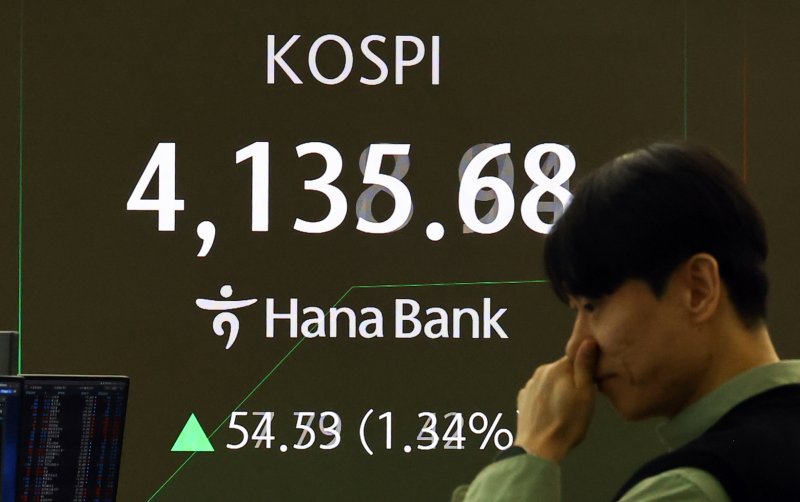KOSPI Narrows Gains to Close Up 0.07% in Firm Trading, While KOSDAQ Drops 1.42% [fn Afternoon Market Briefing]
- Input
- 2025-10-30 14:21:01
- Updated
- 2025-10-30 14:21:01

[Financial News] The KOSPI, which surged past the 4,140 mark early in the session following the conclusion of the Korea-U.S. tariff negotiations, is now showing firm trading with narrowed gains. The KOSDAQ is down by more than 1.4% due to institutional selling.
According to the Korea Exchange (KRX), as of 2 p.m. on the 30th, the KOSPI was trading at 4,083.95, up 2.80 points (0.07%) from the previous day. The index opened at 4,105.95, up 24.80 points (0.61%), climbed to 4,146.72 in the morning, and then pared its gains.
In the main board market, individual investors have net purchased 1.5231 trillion won, while foreigners and institutions have net sold 524.9 billion won and 962.4 billion won, respectively.
By sector, entertainment/culture (2.25%), electrical/electronics (1.70%), and transportation equipment/parts (1.11%) are strong, while construction (-4.10%), IT services (-4.06%), and machinery/equipment (-4.05%) are weak.
Among large-cap stocks, Hanwha Ocean (up 5.53%), SK Square (up 3.82%), and Hyundai Motor (up 3.59%) are rising, while Doosan Enerbility (down 6.22%), LG Energy Solution (down 4.57%), and Naver (down 3.49%) are declining.
At the same time, the KOSDAQ was trading at 888.81, down 12.78 points (-1.42%) from the previous day. Foreign investors have net purchased 99.6 billion won, while individuals and institutions have net sold 6.7 billion won and 38.6 billion won, respectively.
Lee Jae-won, a researcher at Shinhan Securities, explained, "The KOSPI rose as the Korea-U.S. tariff negotiations, one of the biggest factors for volatility this year, were resolved amicably. However, semiconductors retreated following comments from Howard Lutnick, United States Department of Commerce (DOC) Secretary, that semiconductor tariffs were not included in the agreement. Still, the market rebounded in a V-shape on the view that tariffs on Korea would actually hurt the U.S. more."
koreanbae@fnnews.com Ba Han-geul Reporter